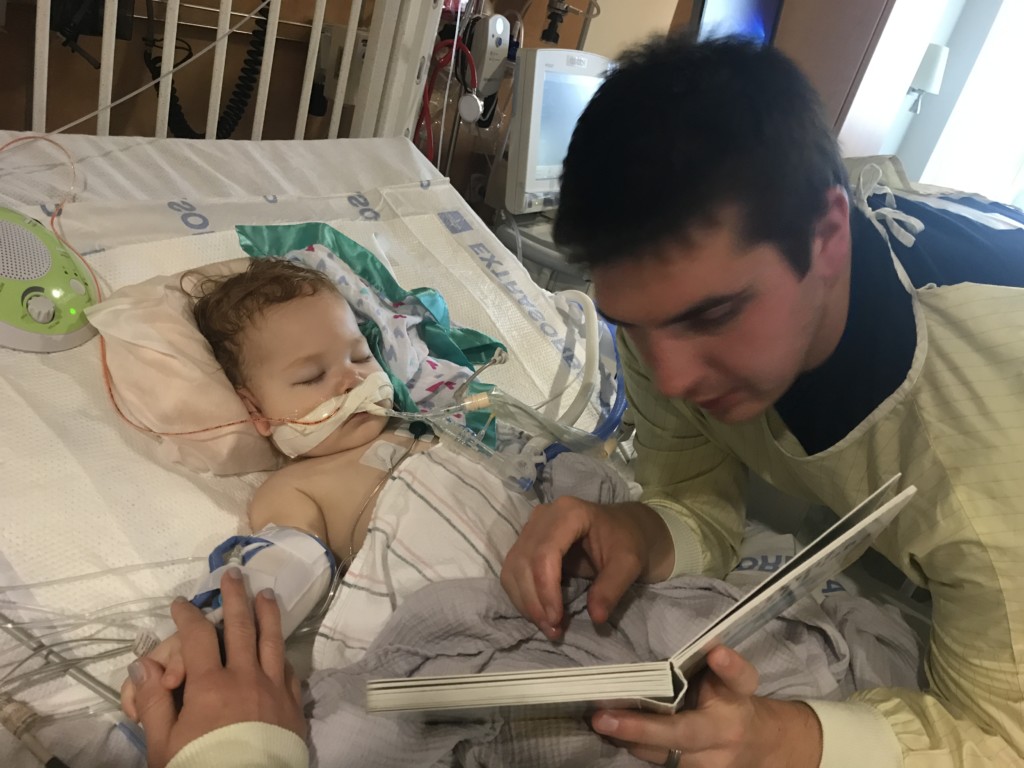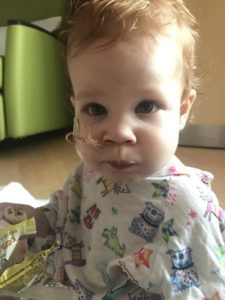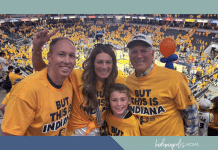
Wednesday, August 22, 2018 is now an unforgettable day for our family. It marks the day when our 14-month old daughter, Tess, took her first ambulance ride after becoming unresponsive at home and was then admitted to the Pediatric Intensive Care Unit (PICU) at Riley Hospital. It’s the day that started six days in the hospital, five in the PICU, beginning with emotional trauma and uncertainty about Tess’s future that we wouldn’t wish on our worst enemies.
Watching Tess heavily sedated and hooked up to various machines, including one that breathed for her, was torture. I wanted so badly to fix it, yet instead, I stood helpless stroking her tiny hands and praying my perfect baby would return to me, hopefully unscathed.
Many things are illuminated when you have a legitimate reason to fear if your child is going to live another day. Suddenly you yearn for normal parent concerns, like ‘Did I offer her enough vegetables today?’ rather than ‘How many more days will my daughter be intubated?’. My mind started racing when I heard the diagnosis: enterovirus that caused encephalitis (swelling of the brain), and I wondered what the immediate and long-term consequences would be. I was told numerous times to think positively because that’s really the only thing I could control. I can also control the sharing of our story, and while this post is not an emotional retelling of our experience because I think that would be too raw, I do want to share some initial reflections now that we have been home for a little over a week (at the time of writing this, not publish date).

Time: When you’re spending nearly 24/7 at the hospital, shift exchanges every 12-hours become a way of telling that time really isn’t standing still. Since sleeping at night was quite elusive given the stress, constant beeping of machines, and nurses coming and going, the days and nights easily blended together. Some tests didn’t happen as quickly as I wanted, intense feelings came and went, yet time marched on, and eventually results were back and treatment decisions made.
Medical Team: We couldn’t have been more thankful for the incredible doctors, nurses, and respiratory therapists who cared for Tess while she was a patient at Riley. We said many times how grateful we are to live in Indianapolis and be literally minutes from this world-renowned children’s hospital. Our main PICU doctor, Dr. Courtney Rowan, even took the time to call my husband, who is a doctor and had to run to take care of a few work-related things one morning, after talking with me about our daughter’s diagnosis and treatment plan. She also understood my desire to hold Tess after over 24-hours of seeing her sedated and lying on a hospital bed, and she ensured that this happened. Her expertise combined with comforting bedside manner gave me a greater peace than I thought possible in our circumstances.
We were also touched by the amazing nurses who graciously cared for Tess, no matter how many hours they had been on their feet working, it seemed they all were genuinely and completely invested in her recovery. We were grateful for their conversations with us, how they advocated for Tess, and even took time to put her favorite lovey near her cheek to make her feel more comfortable when she was sedated. One of our favorite nurses, Becca, even came by to see us once we moved floors, which showed us Tess was more than just “another day at work” to her. The people who work at the Riley PICU are truly phenomenal, yet I hope we never meet again inside those walls.
Faith: Both my husband and I grew up with our Christian faith being an important part of our identity. Although our faith has shifted to be more progressive over the past few years, we both found comfort from our faith, including praying, hearing scripture, and visiting with clergy from our current church. A mantra I kept repeating to myself throughout my daughter’s entire hospital stay was, “God loves Tess as much as you do.” It comforted me knowing God’s love for my child is even greater than my own as a mother, no matter the outcome.
Relationships: During one visit with a clergy person, she asked my husband and me how we had seen God during this time. I answered first that I saw Him through the people, notably the medical team and our family and friends who took time to be with us in the hospital. I shared specifically how grateful I was for Dr. Rowan who took time to explain everything in medical terms, yet also talk to me mom-to-mom. My husband chimed in how touched he was by how many people had been responding to my Facebook posts–ones we were hesitant to even share–and realizing how powerful it was to see how many people were thinking and praying for Tess and us. We were absolutely overwhelmed by the outpouring of love we received, including our parents who dropped everything to spend their days at Riley with us.

While I wish places like the Riley PICU didn’t have to exist, the reality is that children become critically ill all the time. Sometimes, like for Tess, they recover and leave the hospital after less than a week. Other children, though they receive the same medical care and attention, do not recover and their prognosis is devastating. We may never know why Tess gets to be one of the ones who lives to tell her story of healing, but we are beyond grateful our baby girl is still here with us and recovering incredibly at home. We hope we can use our experience to empathize with other families who are scared and overwhelmed navigating a hospital stay with their child to know what helped us: that time will pass, the medical team can be trusted, rely on your faith, and let other people help you.








